Upcoming Summer School: Philology & Manuscripts from the Islamic World
The Leiden University Centre for the Study of Islam and Society (LUCIS) will offer its third Summer school on philology and manuscripts from the muslim world from August 20–30, 2019. This summer school is for graduate (MA and PhD) students and researchers who have an interest in handwritten materials, editing, and the tradition of editing in the Muslim world. It offers theoretical lectures as well as hands-on practice with samples from the world-famous collections of the Leiden University Library.

Over the course of two weeks, specialists from Leiden University and beyond will provide theoretical instruction on issues of editing, paleography, conservation and other material aspects of oriental manuscripts. They will also speak about philology, literacy and orality and the transmission of knowledge in the Islamic manuscript culture, presenting case-studies from various parts of the Muslim world. Participants can use this information to practice their skills in producing a sample critical edition of a manuscript of their choice, under the supervision of experts.
Since the first contributions of scholars such as Scaliger, Golius and Warner, the Leiden University Library has housed one of the most important collections of oriental manuscripts in Europe. It includes thousands of Arabic, Persian and Ottoman manuscripts, not only from the historic heartlands of Islam but also from Asia, al-Andalus and Africa. Each participant will have full access to this collection as well as other library services.
Practical information
- Language of instruction: English. Non-native speakers are required to have a command of English equivalent to at least TOEFL 550.
- Costs: €750,- (including access to the library). Participants are expected to provide for their own travel, visa (if applicable), accommodation and living expenses. LUCIS will provide invitation letters for participants who need to apply for a visa.
- Reduced fee: Participants who are unable to secure financial support from their home institution may be eligible for reduced fees. Please contact LUCIS at lucis@hum.leidenuniv.nl for more information about the possibility of a reduced fee.
Application
Graduate (MA and PhD) students and researchers who have an interest in handwritten materials and text editing are encouraged to apply for participation in the summer school. Applications should include:
- A letter of motivation specifying what research language(s) the applicant masters;
- A curriculum vitae;
- If you are a non-native speaker of English: a certificate testifying command of the English language (TOEFL 550 or equivalent).
The deadline for applications is Monday 17 June, 2019. Participants will be informed about their application by Friday 28 June, 2019. Send your application to lucis@hum.leidenuniv.nl.
Text and image accessed and reproduced with the kind permission of Romy Koreman: https://www.universiteitleiden.nl/en/events/2019/08/lucis-summer-school-philology–manuscripts-from-the-muslim-world
© International Qur’anic Studies Association, 2019. All rights reserved.


